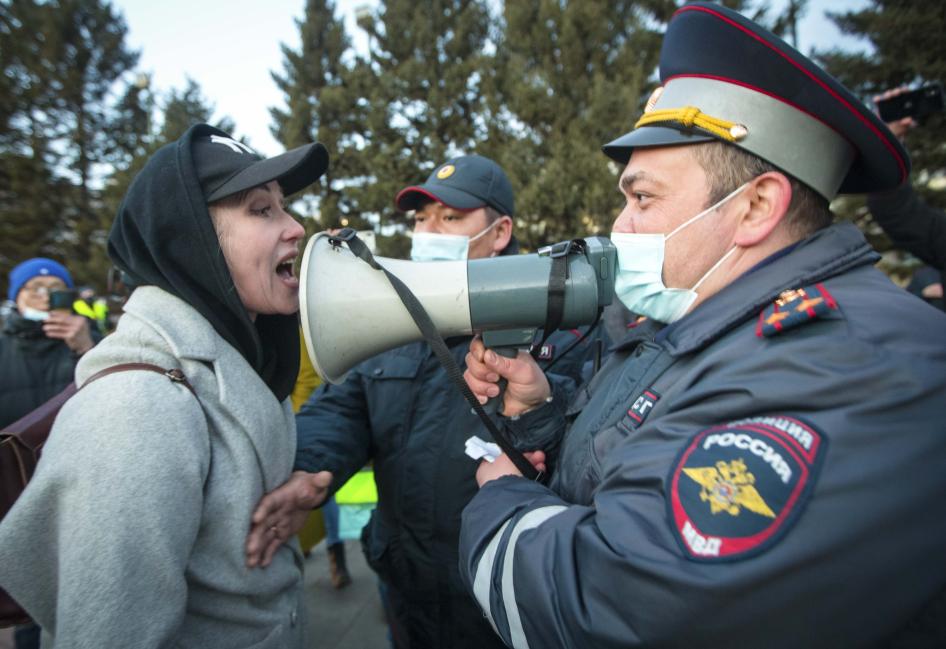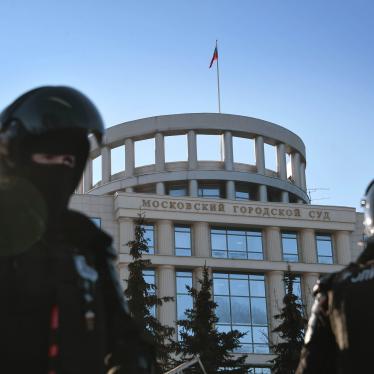(Moscow) – Russian police detained more than 1,600 people countrywide who were taking part in protests on April 21, 2021, against the treatment of the jailed and critically ill opposition figure Alexey Navalny, Human Rights Watch said today. Police also rounded up dozens of opposition activists and raided opposition offices in advance of the protests, but there were far fewer reports of police brutality compared with recent protests in Russia.
The protests in some regions took place during President Vladimir Putin’s state of the nation address to parliament and also concerned corruption, recent steps to label groups associated with Navalny “extremist,” and fears that armed conflicts involving Russia may escalate.
“There was less police violence and brutality on April 21 compared with the January and February pro-Navalny protests, but the authorities’ continued clampdown on freedom of assembly is wholly unjustified,” said Damelya Aitkhozhina, Russia researcher at Human Rights Watch. “The authorities are quick to allege that without police interference so-called “unauthorized” gatherings become violent, but the April 21 protests showed how baseless that allegation is.”
Local experts monitoring freedom of assembly reported that more than 1,600 people were arrested in over 60 cities and towns. They included the first arrests in Magadan, in eastern Siberia, in recent years for peacefully exercising the right to freedom of assembly, media reported. Human Rights Watch researchers monitored the protests online and observed that the protests were overwhelmingly peaceful.
In many cities, the authorities tried in advance to seal off central squares where protesters planned to gather, using thinly veiled pretexts for the closures. In Ulan Ude and Kostroma, it was the need to spray for ticks; in Yekaterinburg, preparations for a military parade; in Tyumen it was a call about an alleged bomb in a nearby building; and in St. Petersburg, it was initially for renovation works. Protesters in these cities still managed to gather in central squares, but in Vladivostok and Khabarovsk protesters had to change the locations for their gatherings.
Across the country as protesters gathered, some held placards and chanted slogans such as “Get a doctor for Navalny,” “Freedom to political prisoners,” “Putin Go Away,” “Russia Without Corruption,” “One for all, all for one,” and “We are for peace.”
In some cities, like Ulan Ude, Moscow, and St. Petersburg, protesters were met with an overwhelming police presence. In Ulan Ude and Bratsk, plainclothes operatives were caught on camera grabbing protesters without identifying themselves or providing any explanations for arrests. In St. Petersburg, video footage captured police repeatedly using electric shocks against a nonviolent protester, after knocking him down. In Samara, media reported police using pepper spray on two protesters, apparently also while they were lying on the ground and posed no threat.
In some cities police demanded protesters’ identity documents and photographed them. The photographs could be used later to charge people with participation in an unauthorized protest.
Media reported at least eight arrests in various parts of the country of journalists covering protests, even though they were wearing press visibility jackets and accreditation badges as required by law. In Dagestan, the police reportedly demanded that detained journalists delete their footage of the protest and detentions before releasing them.
As on previous occasions, the authorities had refused to grant permission for the protests. In some cases the authorities said that by law they needed a minimum of five days’ advance notification, refusing to take into account that the protests were in response to breaking news reports about Navalny’s life-threatening medical condition.
In Moscow the authorities referred to restrictions imposed due to the Covid-19 pandemic. However in March, the authorities did not allow the restrictions to prevent a celebration to mark the anniversary of the occupation of Crimea, at one of Moscow’s largest stadiums, where tens of thousands of people gathered. The General Prosecutor’s Office warned against calls for participation in “unauthorized protests” and threatened protesters with administrative and criminal sanctions, including detention and prison time. The Interior Ministry also invoked the risk of coronavirus infection spreading during mass gatherings.
Also as on previous occasions, police in different parts of Russia detained at least 50 members of Navalny’s team and well-known activists ahead of the protests and searched the homes of at least 13. On April 20, a local coordinator with Navalny’s team in Volgograd, and an activist in Tyumen were each sentenced to 25 days of detention on charges of posting online calls to attend the “unauthorized” protest. On April 21, Navalny’s aides Kira Yarmysh and Liubov Sobol were arrested on the same charges, and several other activists face detention.
Several universities threatened students with expulsion if they participated. After a leak of the personal data of people who registered on free.navalny.com to express their willingness to attend the protests, some people said they were visited by the police, who called them for a “conversation” and asked whether they intended to protest.
Data is not yet available on the numbers of protesters facing administrative or criminal charges in relation to the April 21 protests.
Following previous protests, authorities retaliated against participants with politically motivated prosecutions, which resulted in long prison terms, Human Rights Watch said.
“Russians have a right to peaceful protest and the authorities have an obligation to protect and facilitate that right,” Aitkhozhina said. “The absence of widespread abuse in the police response is a positive sign, but there should be no arbitrary arrests or retaliation for exercising this right.”
This text has been modified to correct information about penalties against participants in the April 21 protests.








